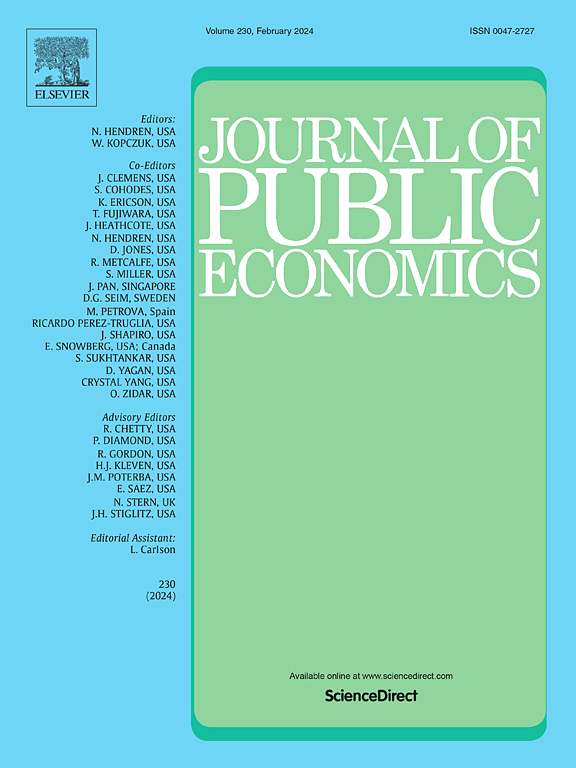什么时候腐败会导致繁文缛节?信息不对称下的贿赂歧视
IF 3.4
1区 经济学
Q1 ECONOMICS
引用次数: 0
摘要
在什么情况下腐败会导致效率低下,什么时候贿赂仅仅是转移?我提出了一个修正的垄断价格歧视模型,该模型显示了在什么情况下腐败会导致政府-企业互动中低效的高行政负担。该模型强调了官僚对公司支付意愿(WTP)以避免行政负担和官僚决定收集这些信息的重要性。如果官僚决定调查企业并了解其WTP,政府-企业互动将具有具有完全价格(即贿赂)歧视的行政负担的帕累托有效水平。如果调查成本太高,政府官员反而会使用繁文缛节,从WTP较高的公司收取更多贿赂,从而造成效率低下的高水平行政负担。我表明,该模型的预测与18年来覆盖158个国家的企业调查中186277次政府与企业互动的数据是一致的。研究发现,当政府官员对企业WTP的了解较少时,腐败会导致行政负担的增加,而且对于WTP较低的企业,这种影响更大。这对如何减轻行政负担和在何处集中开展反腐败工作具有若干政策意义。本文章由计算机程序翻译,如有差异,请以英文原文为准。
When does corruption cause red tape? Bribe discrimination under asymmetric information
Under what circumstances does corruption cause inefficiencies, and when are bribes merely transfers? I propose a modified monopoly price discrimination model that shows under what circumstances corruption leads to an inefficiently high administrative burden in government-firm interactions. The model highlights the importance of the information the bureaucrat has regarding the firms’ willingness to pay (WTP) to avoid administrative burden and the bureaucrat’s decision to gather this information. The government-firm interaction will have a Pareto efficient level of administrative burden with perfect price (i.e., bribe) discrimination if the bureaucrat decides to investigate the firm and learn its WTP. If the cost of investigation is too high, the government official instead uses red tape to extract more bribes from firms with higher WTP, causing inefficiently high levels of administrative burden. I show that the model’s predictions are consistent with data from 186,277 government-firm interactions from 18 years of the Enterprise Survey covering 158 countries. I find that corruption leads to increased administrative burden when government officials have less information about the firm’s WTP and that the effect is larger for firms with a low WTP. This has several policy implications for how to reduce administrative burden and where to focus anti-corruption efforts.
求助全文
通过发布文献求助,成功后即可免费获取论文全文。
去求助
来源期刊

Journal of Public Economics
ECONOMICS-
CiteScore
14.10
自引率
2.00%
发文量
139
审稿时长
70 days
期刊介绍:
The Journal of Public Economics aims to promote original scientific research in the field of public economics, focusing on the utilization of contemporary economic theory and quantitative analysis methodologies. It serves as a platform for the international scholarly community to engage in discussions on public policy matters.
 求助内容:
求助内容: 应助结果提醒方式:
应助结果提醒方式:


